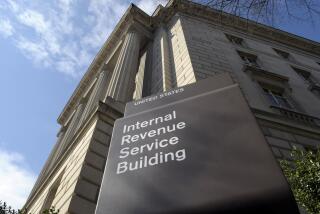Bush Gives Deficit News a Positive Spin
- Share via
WASHINGTON — President Bush on Tuesday delivered what he called “some good news for the American taxpayer” -- a budget update that shows the deficit for this fiscal year, which ends Sept. 30, shrinking from the $423 billion forecast five months ago to $296 billion now.
Bush’s budget office said faster-than-expected increases in tax revenue accounted for $115 billion of the improvement.
“The tax cuts we passed worked,” Bush told a White House audience of aides and Republican members of Congress. The president said the tax cuts generated unexpected economic activity and consequent tax revenue.
Most Democrats were unimpressed.
Rep. John M. Spratt Jr. of South Carolina, the top Democrat on the House Budget Committee, said that when Bush came into office in January 2001, the official White House budget projection showed a $305-billion surplus. So the new projected deficit of $296 billion represents a swing of $600 billion, Spratt said.
“Today’s news is not cause for complacency, much less celebration,” he said.
Sen. Kent Conrad of North Dakota, the ranking Democrat on the Senate Budget Committee, said that the 2006 deficit comes as the baby boom generation is about to retire, with its oldest members beginning to qualify for Social Security benefits in 2008 and Medicare coverage in 2011.
Adjusted for inflation, tax revenue has only now surpassed its level of 2000, Conrad said. In 2002, the White House estimated that revenue would reach $2.5 trillion in 2006 under the tax laws then in effect. The revenue re-estimate issued Tuesday was $2.4 trillion.
Spending re-estimates contributed $12 billion to the decline in the projected 2006 deficit in the last five months, compared with $115 billion for revenue re-estimates.
Altogether, spending is responsible for more of the swing toward red ink since 2002. In 2002, based on the laws then in effect, spending in 2006 was projected to reach about $2.2 trillion; now, it is estimated at $2.7 trillion.
In rough terms, the Defense Department accounted for the biggest share, about $200 billion. Next came the Treasury Department, which pays interest on the rising national debt, at $60 billion.
The Health and Human Services Department -- largely Medicare, which added a prescription drug program -- was responsible for $50 billion, followed by the Agriculture Department ($30 billion), the Homeland Security Department ($15 billion) and the Social Security Administration ($10 billion).
Bush pledged to concentrate his deficit-reducing efforts on spending control.
“It’s OK to create revenue growth,” he said.
“But if we spend all that revenue growth on wasteful programs, it’s not going to help us meet our objectives.”
More to Read
Get the L.A. Times Politics newsletter
Deeply reported insights into legislation, politics and policy from Sacramento, Washington and beyond. In your inbox twice per week.
You may occasionally receive promotional content from the Los Angeles Times.










